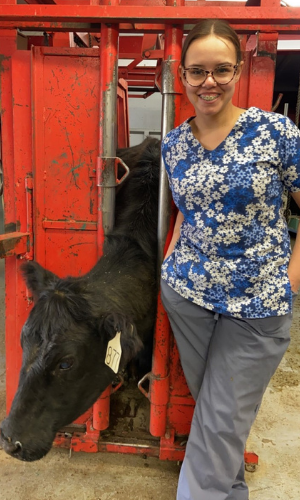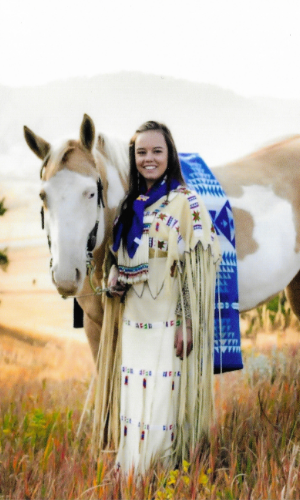Brilliant Bailey from Busby
 An AIEF scholarship allowed Bailey’s dream is to be a USDA meat inspector, ensuring that tribes produce quality food that meets industry standards.
An AIEF scholarship allowed Bailey’s dream is to be a USDA meat inspector, ensuring that tribes produce quality food that meets industry standards.
Bailey Chalfant of the Northern Cheyenne Tribe is a study in motivation and empowerment. This 23-year-old graduate student’s number one priority? The health of her tribe.
Education has always been important to Bailey, a trait passed down by her mother April, who homeschooled Bailey in 6th grade. In Busby, Montana, field trips meant going outside to study nature and care for animals. Her passion for helping others led to dreams of college and making something of herself. Graduating from high school was a defining factor in her academic career and higher education.
A brilliant student, Bailey studied public health at West Texas A&M University but felt under-challenged academically. To bring her education to the next level, she applied for the Native American Political Leadership Program, spending six months in Washington, D.C. She filled her days assisting U.S. Sen. Jon Tester of Montana and her nights finishing schoolwork. Bailey went on to serve former Tribal President Rynalea Peņa, now a Montana state representative.
After earning her bachelor’s in health sciences in May 2021, Bailey returned home to Busby and is now completing her first year as a graduate student at the University of Missoula. Her master’s degree will be in public health with a specialization in environmental health science.
Bailey was awarded a 2021-2022 scholarship by the American Indian Education Fund (AIEF), a program of Partnership With Native Americans (PWNA). The AIEF scholarship helped her continue her education so that she can return home and contribute to a systematic change in her community. Bailey’s dream is to be a USDA meat inspector, ensuring that tribes produce quality food that meets industry standards.
What made Bailey smile was the personal touch from AIEF receiving care packages and cards in the mail. “That support makes all the difference.” Bailey says many Native American students struggle with imposter syndrome and missing home and going from “being raised by a village to living on their own,” when they get to college.
For students struggling to transition to college, Bailey suggests asking older students for help. She found her supportive mentor in an academic counselor. She also tells other students to apply for as many scholarships as possible, saying, “there’s somebody out there who wants to fund you.”
Bailey now works as a veterinary technician at the Animal Care Center in Hardin, Montana, a 50-mile commute one way. Public health and animal welfare are still priorities. Her current project is researching how to address the feral dog population on reservations. Not only is there a safety issue, but dogs can spread diseases. Bailey noted, “a community is accountable for taking care of its animals, but when people are constantly in survival mode, it is impossible to take on that extra responsibility.”
One solution is to fund animal vaccination programs and spay/neuter clinics. According to PETA, one female dog and her offspring can produce 67,000 puppies in only six years. PWNA helps reservation partners rescue stray and injured animals, through our Reservation Animal Rescue (RAR) program.
She encourages Native students to follow their passion and to strive for change and notes this all starts with a good education. AIEF provides school supplies, scholarships, career readiness, and development for tomorrow’s leaders. For every student who receives funding, six more are awaiting college aid.
What Bailey wants friends like you to know is this: ”When you donate to AIEF, you’re funding someone’s passion project,” and supporting a long-term change in tribal communities.
